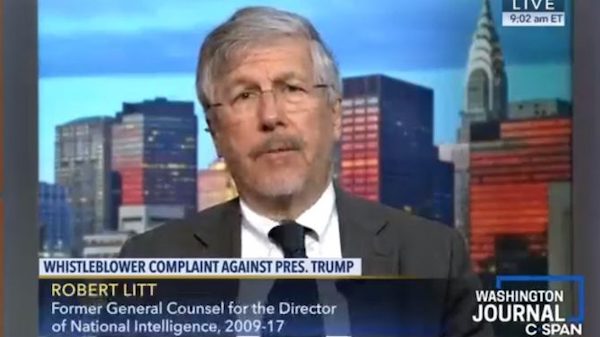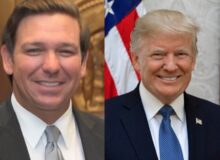Technically, what’s of interest about the man in question, Robert Litt, is the number of Spygate-central waypoints he turns up in. I have to imagine John Durham has at least wanted to talk to him. Litt was one of the “Logan Act” chorus in early January 2017. He was also reportedly the conduit for informing then-DNI James Clapper of the Flynn-Kislyak phone calls. Yet again, he was right in the middle of staffing the last-minute changes to Executive Order 12333 at the same time (which, of course, we would expect him to be).
But there’s more. Robert Litt was General Counsel to the Office of the DNI from 2009 to January 2017. He was the lead attorney for the organization and was thus naturally involved in its chief dramas during that period. What put a focus on him this past week was a tweet from CBS News’s Catherine Herridge, highlighting a recollection by former Acting Assistant Attorney General Mary McCord in her interview with the FBI in July 2017.
#FLYNN In FBI interview, senior DOJ official Mary McCord said McCabe told her about Flynn-Kislyak calls January 3rd, 2017 (1 day BEFORE Strzok notes) McCord notes indicate DNI lawyer also raised Logan Act about the same time + small group w/visibility including Clapper @CBSNews pic.twitter.com/AAJoHc8PUu
— Catherine Herridge (@CBS_Herridge) June 27, 2020
McCord, remember, is the Justice Department official who recalls being informed at the earliest date by the FBI about the December 2016 phone calls between Michael Flynn and Sergei Kislyak. McCord says she learned of the calls on 3 January 2017, in a phone call with Andrew McCabe.
The FBI interview notes also reflect this bit of information:
Page 2 of McCord’s notes [i.e., her contemporaneous notes from that week] indicate General Counsel at the Office of the Director of National Intelligence (ODNI) Bob Litt raised the issue of a possible Logan Act violation. McCord was not familiar with the Logan Act at the time and made a note to herself to look it up later.
Now, we needn’t kid ourselves that it took Litt at ODNI to popularize the Logan Act and get it circulating at the White House nosebleed level. (Herridge’s highlight points out that Litt raised it on 3 January, and then Joe Biden raised it in the Oval Office on 5 January.)
The theme had been a drumbeat for weeks. The media had been bringing it up in connection with Trump at least a month earlier, and by the end of December 2016, the Logan Act was an established theme.
(It reminded me at the time of the “New steps! New steps!” chant from the 1993 Australian film Strictly Ballroom, by Baz Luhrmann.)
Rep. Jared Huffman (D-CA) even introduced legislation to amend the Logan Act. Basically, to make it more likely to stick, so appalled was he that the incoming Trump administration was doing what incoming administrations always do— opening channels with foreign governments during the transition.
So the Logan Act was out there. But: it wasn’t ODNI’s problem to find a legal basis for going after Michael Flynn and ultimately Donald Trump. In fact, if I’d been Litt – at least, Litt in a straightforward situation – I think I would have kept my mouth shut about what was so clearly someone else’s problem, no matter how brightly the bulb flashed over my head. The Logan Act, after all, has nothing to do with intelligence. It’s about diplomacy and influence. It’s not in ODNI’s lane.
So Robert Litt reportedly bringing it up with the DOJ (and probably the FBI; it’s not clear who was in that particular conversation) is noteworthy. It suggests what we may call a lack of professional detachment about the situation.
It’s unlikely that anything Litt did in that regard was prompted by Clapper. There’s Clapper’s general air of somnolence to consider, but he also testified to the House, later in 2017, that the person who first told him about the Flynn-Kislyak phone calls was … Robert Litt. (See p. 35 here.)
Assuming that’s true, it puts Litt in the middle of conveying FBI intelligence about Flynn to Clapper. It doesn’t necessarily mean a whole lot that James Comey said he briefed Clapper on it; Litt could have learned about it earlier and told Clapper as soon as he knew. That wouldn’t be unusual in such a relationship. But coupled with the volunteer “good idea” about the Logan Act, it starts to paint a picture of Litt’s role, and how much he was in the loop on the machinations of Spygate.
He was naturally in the loop on staffing the changes to E.O. 12333, which were signed by Clapper in December 2016 and Loretta Lynch on 3 January 2017. In email correspondence obtained by Jay Sekulow’s American Center for Law and Justice (ACLJ), Litt can be seen in late November, urging a quick staffing turn-around at the Department of Defense, before Clapper’s signature on 15 December.
In an email on 29 November 2016 to someone in the Office of the Undersecretary of Defense for Intelligence, Litt expresses thanks for an update on the status of the 12333 staffing package. Adding, “Really really want to get this done . . . and so does the Boss.”

Emails on staffing of E.O. 12333 amendments package obtained through ACLJ FOIA request; link in the text
OK. So what if Litt was in there pitching for the priorities of the Boss (Clapper) as Obama’s term wound down?
It’s a nice sketch for us of what the Obama administration’s priorities were, and how it operated, for one thing. Five weeks in the life of the ODNI General Counsel: rush through changes to a 35-year-old executive order that would gut the controls on protecting U.S. person identity information (USPI); be the one to tell the Boss about phone calls the FBI listened in on by the incoming National Security Adviser; and stoke the Department of Justice to look at the Logan Act, of all things, for taking whacks at the Trump team.
Litt seems to have taken some well-deserved time off when he left ODNI with the departing administration. In September 2017, he joined the firm of Morrison & Foerster (which goes by the cheeky nickname MoFo, and no, I am not making that up), as of counsel.
Another supporting player from the Spygate cast had already gone to MoFo: John P. Carlin, who abruptly announced his resignation from the position of Assistant Attorney General for the National Security Division at the DOJ on 27 September 2016. That was the day after he apparently tried, unsuccessfully, to sandbag NSA Director Michael Rogers for the chronic misuse of Section 702 “about” queries, which Rogers had discovered in the Obama agencies. (Earlier in 2016, Carlin was the DOJ supervisor of U.S. Attorney Preet Bharara’s prosecution of Evgeny Buryakov, the Russian spy for whose trial Carter Page was a key cooperating witness.)
Litt, however, was the Obama administration alumnus and MoFo expert on intelligence and national security who sat down with C-SPAN in October 2019 to discuss Ukraine and the so-called “whistleblower” complaint.
Litt was not only the former ODNI General Counsel but was and still is a contributor to the Brookings Institution Lawfare blog, edited by James Comey’s good friend Benjamin Wittes (of “Comey memo, shopped to the media” fame). Litt wrote an article about the “whistleblower” situation for Lawfare on 17 September, very shortly after the news of it broke.

Washington’s got a secret. Pixabay; L.U. graphic
It has become a running, half-sarcastic refrain among Spygate analysts that the “whistleblower” complaint was actually written not by a dewy-eyed whistleblower but by the stable of volunteers at Lawfare. Indeed, the complaint was written in the style of a professional briefing document. It’s short on substance internal to the actual U.S. government intelligence community but very, very long on perfectly footnoted references to media reporting.
Without suggesting that Robert Litt – however, well he knew the landscape at ODNI where the complaint was processed – participated in writing it, it’s certainly no stretch to suggest that he may know who did.
 Dynamic duo. (Adam Schiff, L, CNN video; Jerry Nadler, GMA/ABC News video)
Dynamic duo. (Adam Schiff, L, CNN video; Jerry Nadler, GMA/ABC News video)
With a recent history like this, it’s no surprise that Litt was Deputy Assistant Attorney General in the Criminal Division, and then Principal Associate Deputy Attorney General in the Clinton administration in the 1990s. He worked for Eric Holder during part of this period when Holder was Deputy Attorney General. Like a number of the Clinton presidency alumni, Litt was a partner at the firm Arnold & Porter from 1999 to 2009, reportedly specializing, among other things, in CFIUS compliance. Litt was also touted, then as now, for extensive expertise in FISA matters, gained in his 1990s DOJ jobs.
But it’s his interesting record of being sent to explain the Obama administration’s pattern of questionable electronic surveillance of Americans, and adjusting regulations to make that easier, that in hindsight stands out.
NCTC and FBI again
In 2012, for example, Robert Litt was front and center reassuring the public about a rules change that would allow the National Counterterrorism Center (NCTC) to retain personally-identifying information on Americans for five years, instead of the 180 days authorized at that time. The decision was being explained in March 2012, simultaneous with the implementation of the new memorandum of understanding (MOU) we have looked at in the past that allowed USPI to be shared more freely and automatically between the FBI and NCTC.
This was also, of course, at the same time John Brennan’s old company, The Analysis Corporation, had database maintenance and analysis contracts with both the FBI and the NCTC.
The New York Times’s Charlie Savage provided additional detail at the time:
The guidelines will lengthen to five years — from 180 days — the amount of time the center can retain private information about Americans when there is no suspicion that they are tied to terrorism, intelligence officials said. The guidelines are also expected to result in the center’s making more copies of entire databases and “data mining them” — using complex algorithms to search for patterns that could indicate a threat — than it currently does.
Savage pointed out critics’ concern that this measure would resurrect a program partially shut down during the Bush administration. That sought to fuse “vast archives of electronic records — like travel records, credit card transactions, phone calls and more — and search for patterns of a hidden terrorist cell.”

Don’t even think about it. Guard gate at the National Counterterrorism Center (NCTC) in McLean, VA. Google Street View
It was then in July 2013 that Litt participated in testimony to the House Judiciary Committee on not just a “two-hop” but a “three-hop” standard for expanding electronic surveillance beyond individual targets.
As A.P. recounted, congressmen established with the witnesses that “If the average person calls 40 unique people, three-hop analysis could allow the government to mine the records of 2.5 million Americans when investigating one suspected terrorist.” (The database collection that facilitated this has since been significantly curtailed. That makes it a longer process, but still not impossible, to perform the same data-mining, as see in the next section. Taking the long way around, the feds may order the telecom providers to do it.)
Scanning emails on the sly
Litt popped up again in December 2016, when Congress was indignant about the Obama administration issuing a secret FISA order to Yahoo to scan user emails for keywords in real-time and hand them over to a “government agency” – implicitly NSA, but probably including the FBI as well.
Litt is recorded as offering the following argument: “Computerized scanning of communications in the same way that your email service provider scans looking for viruses – that should not be considered a search requiring a warrant for Fourth Amendment purposes.”

Pixabay
That little-remembered secret-scanning interlude began, remarkably, in about April or May 2015. Yahoo’s I.T. security team discovered a program running stealthily to scan user emails: “The sources said the program was discovered by Yahoo’s security team in May 2015, within weeks of its installation. The security team initially thought hackers had broken in.”
But it turned out the CEO had quietly authorized the scanning program to be initiated on the system.
Recall that that was also the timeframe when Dutch national intelligence reportedly informed the U.S. that Russia was reading the emails of U.S. targets like employees of the Democratic National Committee. (The specific reports referenced at the link say the Dutch informed the U.S. “in the summer of 2015.” However, the same reports indicated the Dutch, using the same intelligence method, had caught an intrusion into the State Department system back in 2014, and had informed U.S. agencies of that as well. It is thus quite possible that the FBI knew about the Russian monitoring of DNC accounts at the time the FISA order was issued to Yahoo. The likelihood that the two developments were connected is pretty strong.)

James Comey (Image: ABC video screengrab)
James Comey later claimed that his knowledge of that vulnerability – and a Russian report of Loretta Lynch assuring Hillary Clinton, through intermediaries, that the probe of Clinton’s emails “wouldn’t go too far” – infused his decision to exonerate Hillary on his own authority in July 2016.
The FISA order on the email scans was probably issued to other carriers as well. Litt was deployed to reassure the public on the matter. The Obama administration said the intelligence Gang of Eight in Congress knew about it.
Certainly, Litt did. Given his level of engagement on Spygate themes as the Trump inauguration approached, it’s hardly unrealistic to guess that he had a pretty good idea why all these things were being done as well.
Cross-Posted with Liberty Unyielding
Robert Litt
Robert Litt
Robert Litt
Robert Litt






